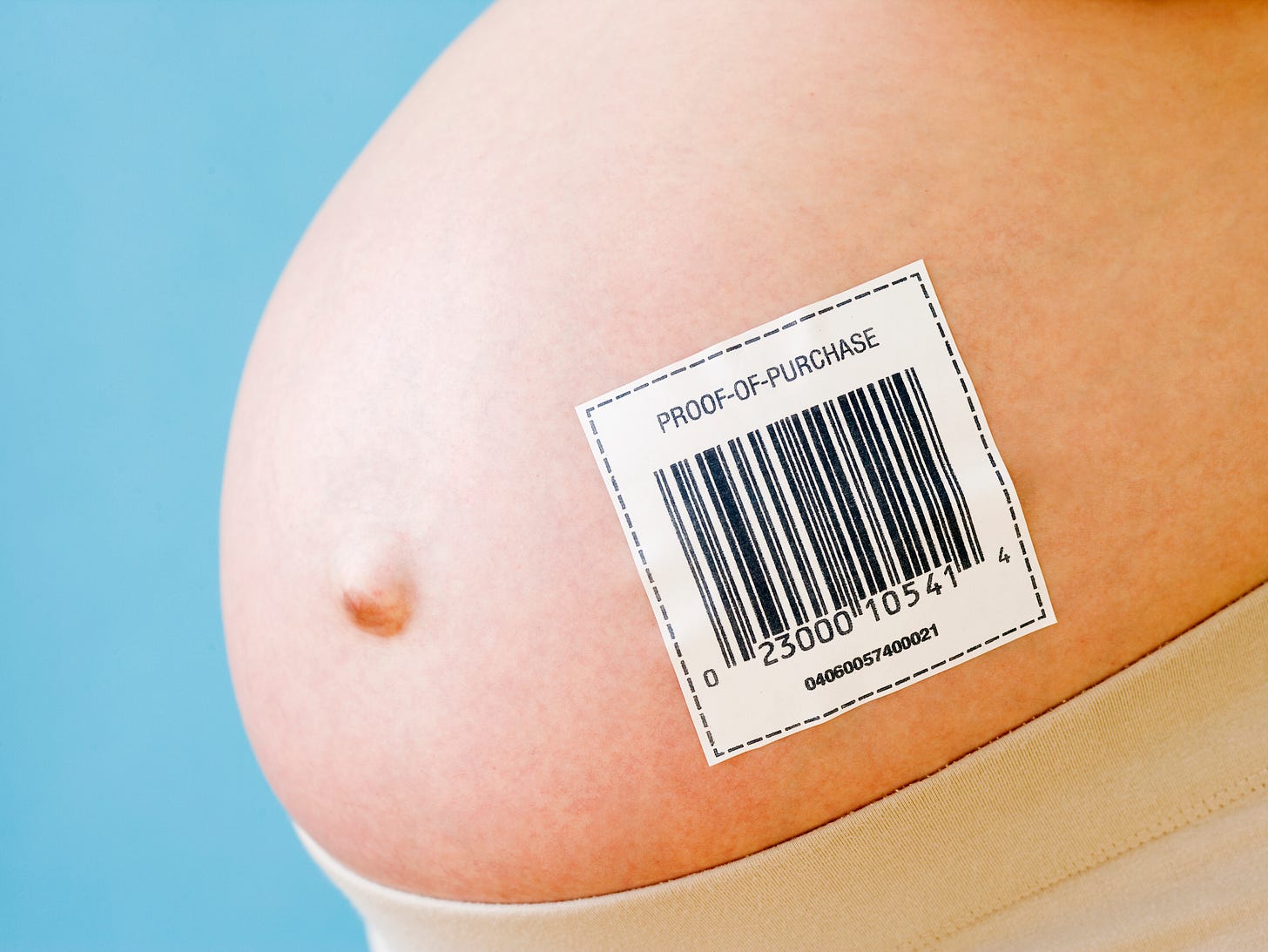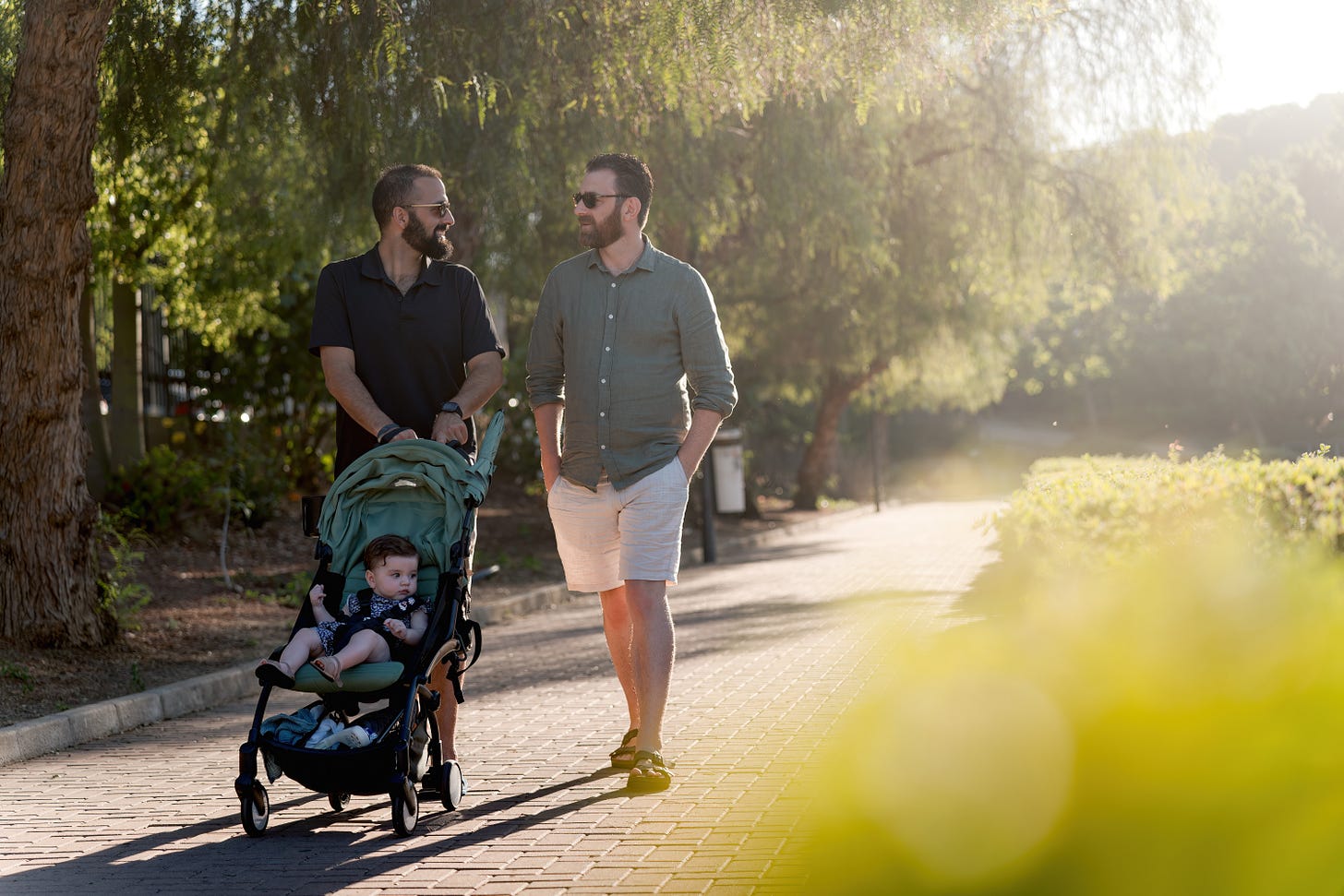Men buying babies: The great surrogacy con
No-one has the right to a child, so why can a baby be bought and sold, just like a car?
The Royal College of Midwives has promoted the company My Surrogacy Journey, which encourages women to loan out their wombs with the promise of an Apple Watch, Gousto meal box and Merlin theme park pass.
On 3rd January 2019, a law was passed in the UK allowing single men to become the legal parents of children conceived through surrogacy.
And there is no legal upper age limit - shockingly, anyone aged 18-99+ can acquire a baby via surrogacy and apply for a parental order, which means the baby is legally theirs and not the woman who carried the baby and gave birth.
In the UK, where commercial surrogacy is banned but international imports are not, between 400 and 500 new surrogate-incubated babies are now registered each year.
Many single and older men are now buying a baby via surrogacy: since 2019, as many as 95 parental orders for surrogacy in England and Wales have been issued to single men. In the past five years, almost 300 men aged 50+ have applied to become the legal father of a surrogate child – and 43 of these are over 60. This summer, a 72-year-old man in Scotland got a parental order for a three-year-old boy born to a surrogate mother in the US in 2020.
And there are shocking examples of men buying babies to satisfy their depraved sexual desires, for example, a man in Australian who abused his surrogate born twin daughters and was subsequently jailed for 22 years. Surrogacy is enabling child abusers to buy babies. You may recall the Baby Gammy scandal back in 2014. David John Farnell, 56, and his wife abandoned their baby son Gammy, who has Down syndrome and a congenital heart condition, leaving him with the Thai surrogate mother. The couple brought Gammy's healthy twin sister home, but it was later revealed that Mr Farnell has 22 child sex convictions, some going back to his twenties.
Adam Stafford King, a gay man based in Chicago, was arrested on child sexual abuse charges just a couple of days before his son via surrogacy was born in California. King, who was due to come to the UK to be a judge at Crufts, has pleaded not guilty.
Surrogacy is big business, and there is a growing market of gay male customers. An online service called BUM (Bottoms Up Movement) sells items that can be used to facilitate anal sex between men – such as lubricant and fibre supplements. But that’s not all they offer:
“…at the heart of BUM’s mission is the recognition that same-sex couples face significant challenges when starting a family. The costs associated with assisted reproductive technologies can be staggering, with IVF and surrogacy expenses often exceeding $100,000.”
BUM donates to an outfit called Men Having Babies, based in New York where all aspects of commercial surrogacy are legal. MHB describes itself as “a nonprofit organisation comprised of gay dads, surrogates and allies that serve the LGBTQAI community”.
“We’re extremely worried about the global explosion in numbers of people pursuing surrogacy; particularly amongst single men”, says Helen Gibson of Surrogacy Concern, a UK-based campaign group which aims to ban all forms of commercial surrogacy, “which we believe presents a severe safeguarding risk. Babies need their birth mothers.”
In Scotland, young women are being encouraged by its government to donate their eggs due to safety concerns. SNP Ministers have been accused of using female bodies as "public resources" in a publicly funded drive for more donors. The digital campaign was launched in 2021 in an attempt to encourage Scots to become sperm and egg donors. Woman as young as 18 were targeted.
At the University of Edinburgh medical school building this week, it was reported to Surrogacy Concern that there was an egg donor stall and leaflets on every table in the cafe.
In countries like Ukraine, Mexico and Georgia, surrogacy tourism is rife, with rich Westerners, including British “commissioning parents” paying local women to carry their babies. Can it really be right that you can effectively buy a baby overseas, then raise it in Britain, where commercial surrogacy is supposed to be banned?
Under English surrogacy law, a child’s legal mother is the woman who carries and gives birth to the child, regardless of whether or not the child is genetically hers. An application for such a transfer of parental responsibility can only be made with the surrogate’s consent – but the decision hinges on what the Court considers to be in the best interests of the child, rather than those of the surrogate mother.
Despite an advertising ban in the UK, commercial, foreign companies, including Men Having Babies, hold events and advertise their services to commissioning parents in the UK. Despite the ban on commercial surrogacy here, UK agencies are able to have operations overseas, and they freely advertise on social media with a view to making private arrangements to broker deals with UK citizens overseas. This is a flagrant violation of the law, but nothing is ever done to stop it.
The surrogates are often treated appallingly. One recent case is that of American couple Marty and Melinda Rangers who demanded that the surrogate mother carrying their baby terminated the pregnancy because they discovered she had been drinking alcohol. The contracts given to surrogate mothers are often horrific, detailing what the woman can and can’t eat, forbidding her to engage in certain activities, such as air travel, driving, riding a bicycle or having sex with her partner.
Make no mistake, what happens in countries such as the US and Australia that legalise commercial surrogacy will happen here if the UK government fails to clamp down on this vile trade in wombs and babies.
But the Royal College of Midwives has promoted the company My Surrogacy Journey, which encourages women to loan out their wombs with the promise of an Apple Watch, Gousto meal box and Merlin theme park pass.
And the chair of Surrogacy UK has said that “Surrogates don’t see themselves as mothers, they see themselves as extreme baby-sitters.”
The health risks for mother and baby are significant. Embryos made using other women’s eggs are often rejected by the body. Being implanted with multiple embryos, which some clinics do to increase the chance of a successful birth, can also cause major problems.
And recent changes to fertility law allows people with HIV to donate their eggs, sperm, or embryos for use in fertility treatment to a known recipient.
A baby dealership in Ukraine
Anna (not her real name) agreed to be a surrogate for a gay male couple in the UK who had promised she could be part of the baby’s life, but then pushed her out once the child was born. Anna, also UK based, told me that being a surrogate had a “significant and complex impact” on her life. “I suffered an incredible amount of grief and loss,” Anna tells me. “I had a deep connection to the child, which is celebrated in normal pregnancy but is vilified within surrogacy.” She was shamed by the couple for wanting to keep in touch with her own baby. Anna, regretted agreeing to hand over the baby, and has now managed to revoke the parental order in the High Court, but states:
“I genuinely believe that there is no safe way for surrogacy to be practiced within society,” she says. “The immediate and long lasting trauma is not acknowledged for both the surrogate mother and child. Surrogacy should not be celebrated, but rather should be discouraged as a way to create a family.”
Richard Westoby is Director of International Business Development for the US-based Ivy Fertility disagrees. A gay man with 12-year-old twins born through surrogacy, he says “ethical surrogacy is possible”.
“I have seen the number of single gay men having surrogate babies, split up, or can’t find a partner”, says Westoby, explaining that the 2019 law means that the numbers of single men going to the US for surrogacy services has increased, because now, they are allowed to be on the birth certificate as ‘parent’.
Because the birth certificates of these babies show no mother, the UK court sends her a document to sign confirming that she agrees to relinquish the parental relationship.
Westoby is keen to stress that it doesn’t have to be a “free for all”. He tells me: “Having a pro-active situation where everyone is treated well, everyone goes through psychological tests, and everyone can be legally represented is the way to do it.”
This year, Westoby has spoken to 123 single men worldwide who are considering having a baby via surrogacy. In 2020, there were only three.
What we see happening across the US, where the commercial surrogacy trade is booming, is what will happen in the UK if we allow the laws to become more liberalised. Campaigners are scared for women and children as Labour has not ruled out relaxing British surrogacy law.
It is an ethical abomination to deliberately bring a child into the world in order to separate it from its mother at birth. The last thing the government should do is make it even easier to do so by treating it like any other business.
Gay men have become a smokescreen for this vile trade in babies. The majority of those accessing surrogacy services are infertile heterosexuals, but there is a growing market in those who consider pregnancy and childbirth too much of an inconvenience. But now that babies have been commercialised to the point where buying one is as easy as getting a new car, we should not be surprised when child abusers spot another opportunity to carry out their sick acts of abuse without fear of suspicion or detection.









So when it comes to making babies, precisely no one is confused about what a woman is.
Well done Julie. The "surrogates" are the purchasers, the baby's mother is the woman who intimately shared it's first nine months of life. Because babies aren't zero when they are born, they are nine months old, with a profoundly dependant relationship with one person and one person only - their mother. You can whitter on about genetics, which suits men nicely, but a baby doesn't care about genetics, it only cares about the smell, the sound, the feel, the energy of it's mother. Remove that and the babies and mothers suffer profoundly. It's against UK law to remove a puppy from it's mother, but removing a human baby from it's mother is just fine guys if that's what you want.
Just like porn and prostitution, this is yet another comercialising of the female body using the world view of men to pretend it isn't cruel and life-threatening to women and children.